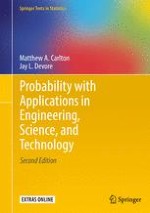2017 | OriginalPaper | Buchkapitel
7. Random Processes
verfasst von : Matthew A. Carlton, Jay L. Devore
Erschienen in: Probability with Applications in Engineering, Science, and Technology
Aktivieren Sie unsere intelligente Suche, um passende Fachinhalte oder Patente zu finden.
Wählen Sie Textabschnitte aus um mit Künstlicher Intelligenz passenden Patente zu finden. powered by
Markieren Sie Textabschnitte, um KI-gestützt weitere passende Inhalte zu finden. powered by
